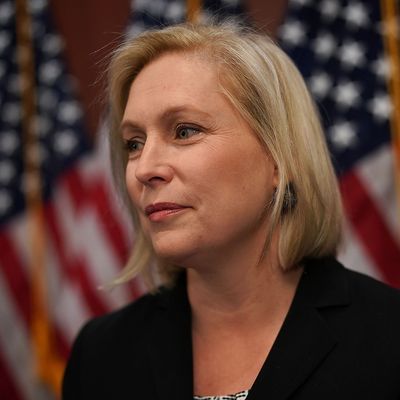
Opposition to the role of corporate money in politics is a pillar of the Democratic Party’s platform; but the use of corporate money for politics is a pillar of its electoral strategy.
This contradiction bedeviled Hillary Clinton in her 2016 primary against Bernie Sanders, whose talent for online fundraising (and initial indifference to winning) allowed him to forgo high-dollar donations. Throughout that race, Clinton had to simultaneously argue that Citizens United must be overturned because big money donors are inherently corrosive to democratic politics — and that it was absurd to suggest that such donors had influenced her politics in any way whatsoever.
Kirsten Gillibrand (apparently) has little interest in trying to square that circle herself in 2020. And so, the New York senator announced in a Twitter video Wednesday that she has decided to quit corporate cash.
Hours later, her fellow presumptive 2020 candidate, New Jersey senator Cory Booker, followed suit.
In making these pledges, Booker and Gillibrand joined Sanders, Elizabeth Warren, and Maria Cantwell in the Senate’s “Not for Sale (to Corporations, Anymore)” caucus.
This development is notable, but not surprising. By all appearances, the 2020 Democratic field is going to be flooded with progressive senators with barely distinguishable policy views. And when (putative) ideological differences are slim, credibility can be decisive. No one wants to be the fifth Democrat on the debate stage who supports single payer — but the only one of those five who takes campaign cash from insurance companies.
And there’s very little for a safe, blue-state senator to lose in spurning corporate PACs. Gillibrand is not going to lose her seat this November. And “I’m not taking any money from corporate America, so please, dear progressive member of my email list, affirm my brave choice by clicking this link” has proven to be a highly effective line for generating lots of cash from small-dollar donors. That gambit obviously served Sanders well in the 2016 primary; but it also helped Democratic congressman and U.S. Senate candidate Beto O’Rourke outraise Ted Cruz last cycle.
So, odds are that Kamala Harris, and/or other 2020 prospects will soon conclude that more corporate money means more campaign problems.
Whether these developments will have a significant impact on the Democratic Party’s internal politics is difficult to say. In competitive down-ballot races, you aren’t going to see many little-known Democratic challengers refusing to drink from the special-interest spigot — not when the other side is swimming in Koch money.
Regardless, the mere fact that the party’s leading lights feel compelled to perform this gesture is a testament to the left’s growing strength within Team Blue’s tent. That strength is also reflected in the breadth of support among congressional Democrats for single-payer health care, free public college, universal child care, paid family leave, and an (admittedly vague) anti-monopoly regulatory policy.
And, as those who wish to occupy the “progressive” lane in 2020 keeping jockeying for advantage, the boundaries of that lane are bound to creep leftward: One day after Booker raced to catch up with Gillibrand on campaign finance, Gillibrand signed onto Booker’s bill to end the federal prohibition of marijuana.






























